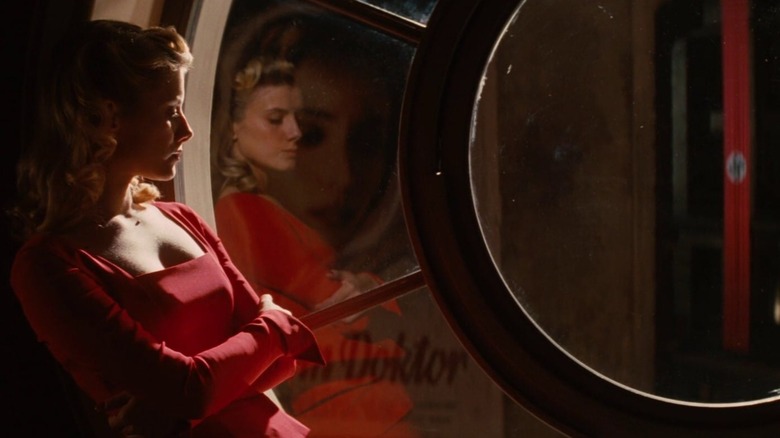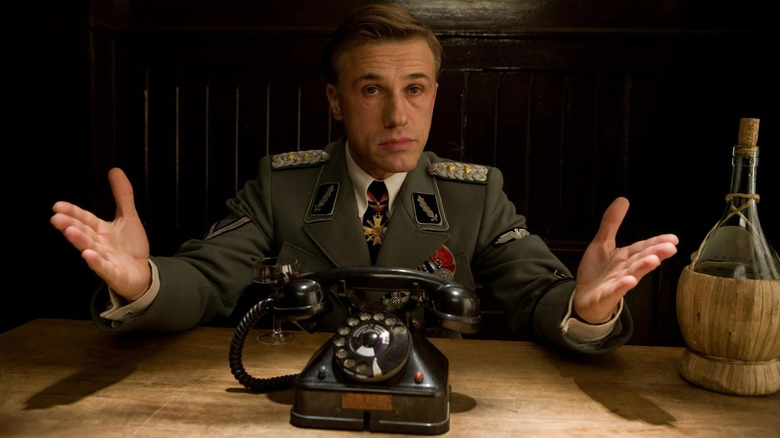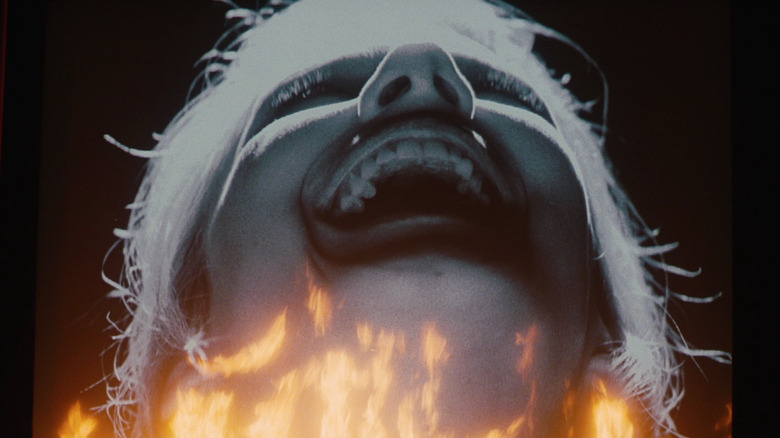Inglourious Basterds Ending Explained: Historical Vengeance, Tarantino Style
"Inglourious Basterds" was one of the first films by director Quentin Tarantino to set his penchant for bloody revenge flicks inside the history books. It's a film that has since spawned similarly revisionist tales like "Django Unchained" and "Once Upon a Time in Hollywood." Over the course of five chapters, the film entangles its ensemble cast in its alternate WWII history and salient points on German cinema — with Tarantino relying on both to satirize the use of film as effective war propaganda. Of course, that doesn't prevent "Inglourious Basterds" from ending on a particularly bloody note with the barbecuing of a cinema filled with Nazis by the film's hero Shosanna Dreyfus (Mélanie Laurent).
But Tarantino's film about a Jewish cinema owner and a platoon of Jewish soldiers plotting the assassination of the Third Reich leadership is more than just a revenge fantasy. If it was, then the film would've solely focused on Shosanna's vendetta against the man who had her family murdered: Colonel Hans Landa (Christoph Waltz). Or just an endless reel of clips of the Basterds gunning down Nazis. Instead, and with a great many ironies, "Inglourious Basterds" reveals a nuanced lesson in vengeance and survival. Its ending reveals the consequences of the lengths we go to claim and justify both in the bittersweet fruition of both Shosanna's and Landa's respective stories.
Hans Landa cuts a deal
At the end of the film, Landa attempts to negotiate with Aldo Raine (Brad Pitt) and Pvt. Utivich (B.J. Novak) his "conditional surrender." It's a scene that recalls the interrogation of Perrier LaPadite (Denis Ménochet) that "Inglourious Basterds" opens with. For one, Landa's anti-semitic analogy about Germans being hawks and Jews rats says a lot about his own willingness to become a turncoat and jump a sinking Nazi ship. Then there's the matter of his nickname — "The Jew Hunter" — which at the beginning of the film he tells LaPadite he's proud to have earned because it means he's good at his job. But Landa's reaction to his nickname at the end of the film is tellingly different. "Do you control the nicknames, your enemies bestow on you? Aldo the Apache and The Little Man?" he asks, with Utivich's dismayed reaction nearly proving his point.
Ironically Landa's goal in striking a deal with the OSS commanding officer (Harvey Keitel) was to escape retribution by a Jewish tribunal. Though by the film's end that's exactly what he earns himself when Raine carves a swastika into his skin. Landa attempts to transition from villainous opportunist to hero by offering the Allies a deus ex machina — at least on the surface. After all, Landa is still unaware of Shosanna's plan, which would've gone off like clockwork even without him placing extra dynamite in Hitler's box or trying to warn them. This at first leaves a slightly bad taste in your mouth, knowing a Nazi like Landa will get everything he traded for — including a slice of Nantucket Island — thanks to the sacrifices of Jews. Thankfully, his eagerness to leave behind his past doesn't sit well with Raine, and he carves his "masterpiece" into his forehead. Giving Landa a mark, for all his charisma and adaptability, he will never be able to outrun.
Shosanna's vengeance and pity
In complete contrast to Landa's self-serving motivations is Shosanna. If there's one hero in "Inglourious Basterds" — one bid for vengeance you can fully align yourself behind — it's hers. She endures the pestering advances of Frederick Zoller (Daniel Brühl) and an encounter with the man who executed her entire family, all while planning the assassination of the Third Reich. She's not even sidetracked by Landa and a temptation to exact revenge on him. Instead of going full "Kill Landa Vol. 1 & 2" she focuses on an even more monumental but far-more collectively altruistic goal. It's because of this that her need for revenge and the violent actions she takes to achieve it is more easily stomachable than the scenes in "Nation's Pride" or even the Basterds themselves. As when Sgt. Donny Donowitz (Eli Roth) and Pvt. Omar Ulmer (Omar Doom) open fire on the Nazis from the theatre balcony. A scene that invokes images of Landa ordering his soldiers to fire on Shosanna's family hiding beneath the floorboards.
Her one downfall is a misplaced pity for Zoller. After his petulant infatuations turn aggressive and threaten to draw attention to her plans, she shoots him in the back. But then she glances at the silver screen, sees the sole star of "Nation's Pride," and finds her anger softened by the illusory magic of the cinema. Maybe it was pity — or perhaps she believed she'd misjudged Zoller, who'd come to the projection room wanting to commiserate over a distaste in seeing his military exploits glorified. Whatever the reason she goes to his side only to be shot by him in return. But while Shosanna's death is devastating it's somewhat fitting her personal tragedies frame "Inglourious Basterds." Even as she lies dying she exists as the immortal "giant face of Jewish Vengeance," delivering the trapped Nazis to their fiery graves.


